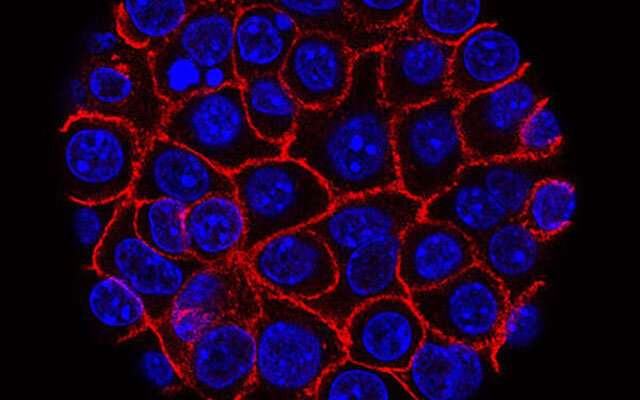This article has been reviewed according to Science X's editorial process and policies. Editors have highlighted the following attributes while ensuring the content's credibility:
fact-checked
trusted source
proofread
A four-drug chemotherapy regimen improves survival in stage 4 pancreatic cancer: Phase 3 clinical trial

A four-drug chemotherapy regimen provided longer overall survival than a two-drug combination in a Phase 3 clinical trial for metastatic pancreatic ductal adenocarcinoma. The study is believed to be the first metastatic pancreatic cancer study in nearly a decade to have a positive endpoint for overall survival.
Dr. Zev Wainberg, co-director of the UCLA Health GI Oncology Program and a researcher at UCLA Jonsson Comprehensive Cancer Center, is first author of the oral abstract describing the results presented at the ASCO Gastrointestinal Cancers Symposium Jan. 20 in San Francisco.
"There have been several chemotherapy regimens used to treat newly diagnosed, metastatic pancreas cancer, also called stage 4, but there have been few head-to-head comparisons to see which regimen would produce a longer overall survival," Wainberg said. "These trials help answer critically important treatment questions for all who treat pancreas cancer."
For the study, 770 patients were randomly assigned to one of two chemotherapy regimens. Patients in the four-drug group had an overall survival of 11.1 months, compared with 9.2 months for those in the two-drug arm. Progression-free survival also increased with the four-drug therapy—7.4 months versus 5.6 months with the two-drug regimen. Several side effects, such as diarrhea, nausea and low levels of potassium, were more common in patients taking the four-drug treatment, but anemia and low levels of white blood cells were more common in those taking the two drugs.
The four-drug regimen consisted of liposomal irinotecan, 5-fluorouracil/leucovorin and oxaliplatin—together referred to as NALIRIFOX. The two-drug therapy consisted of nab-paclitaxel and gemcitabine.
"This study indicates that the more aggressive chemotherapy approach should be considered for those patients who are able to tolerate it," Wainberg said. "Metastatic pancreas cancer has long been recognized as a very difficult type of cancer to treat, but this study represents a possible new reference standard for current treatment and for future research and drug development."
The clinical trial included patients in more than 25 countries, with Dr. Eileen O'Reilly, a GI cancer specialist at Memorial Sloan Kettering Cancer Center, serving as senior investigator.
ASCO, the American Society of Clinical Oncology, will hold the Gastrointestinal Cancers Symposium Jan. 19–21 online and at Moscone West in San Francisco.
More information: Conference: conferences.asco.org/gi/attend
Abstract LBA661: NAPOLI-3: A Randomized, Open-label Phase 3 Study of Liposomal Irinotecan + 5-fluorouracil/leucovorin + Oxaliplatin (NALIRIFOX) versus Nab-paclitaxel + Gemcitabine in Treatment-naïve Patients with Metastatic Pancreatic Ductal Adenocarcinoma (mPDAC)



















